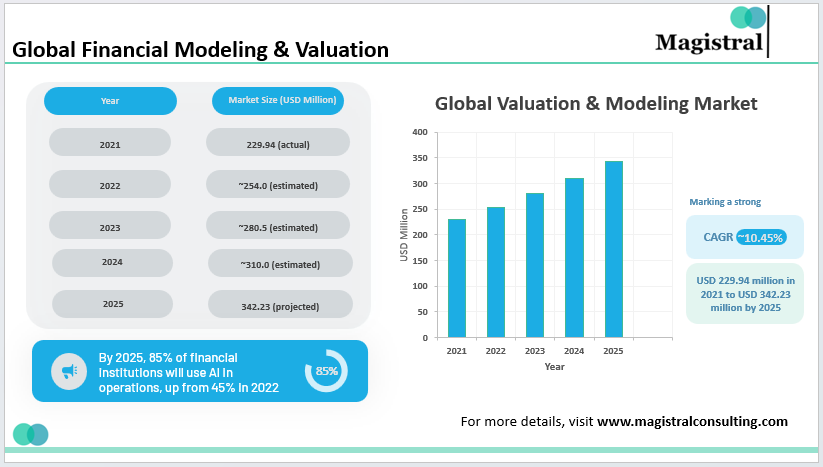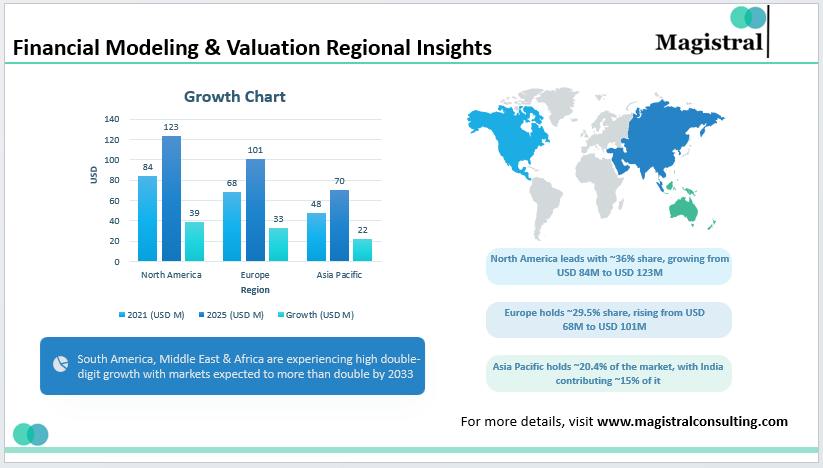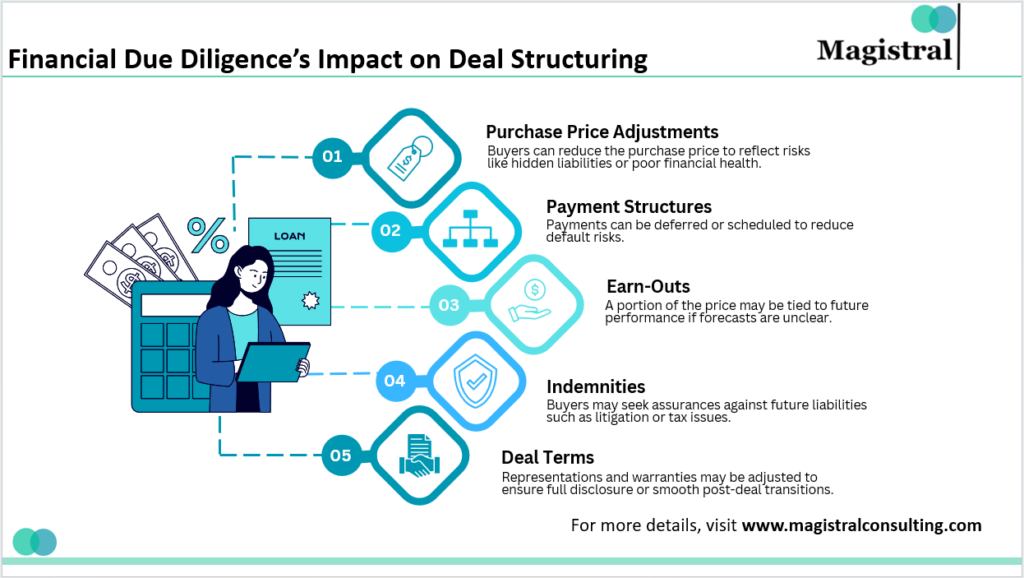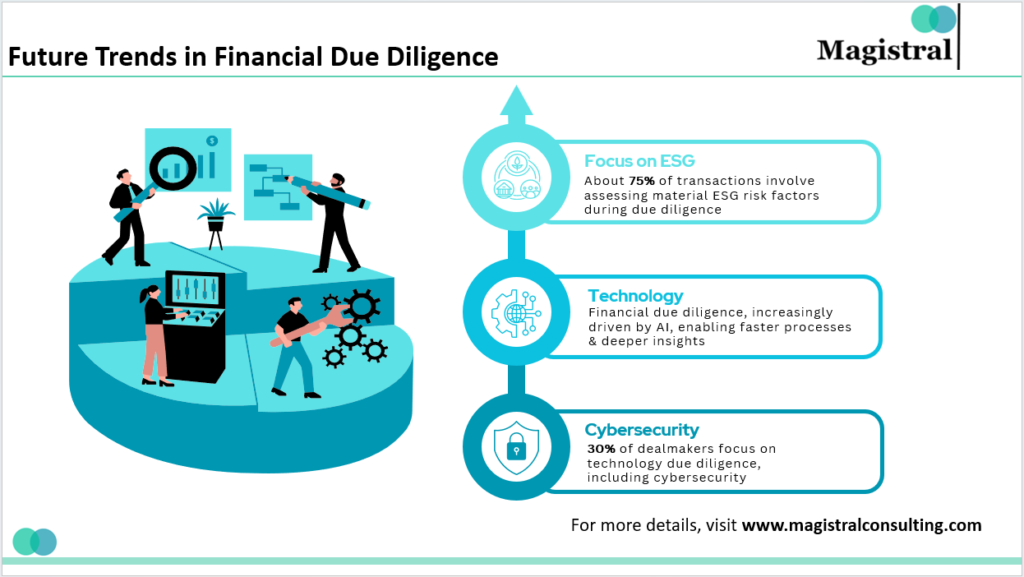Cash flows and value are like romantic partners in contemporary times called complexity, uncertainty, and rapid change, and are perhaps not considered back-office exercises anymore. Financial modeling & valuation have become strategic imperatives underpinning crucial business decisions. Hence a capital raise pitch requires building strong financial models, shaping M&A transactions, conducting scenario planning, and facilitating long-term growth strategies. Financial modeling & valuation ensure that leaders exercise clarity and confidence to act decisively in competitive and dynamic markets.
Global Financial Modeling & Valuation
According to research, the global financial modeling & valuation market is likely to expand from USD 229.94 million in 2021 to USD 342.23 million in 2025 and further grow up to USD 758.12 million by 2033, at a much higher CAGR of ~10.45%.

Global Financial Modeling & Valuation
The related financial modeling & valuation services segment was valued at about USD 0.28 billion in 2024 and is expected to reach USD 0.66 billion by 2033, with a CAGR of about 10.5%.
Broader markets of corporate financial modeling & valuation have also shown growth, estimated at USD 1.71 billion in 2024, and are expected to escalate to USD 1.88 billion in 2025, growing at an average CAGR of 10.4%.
The Financial Valuation & Modeling industry is forecasted to rise at a CAGR of 7.3% from USD 7.8 billion in 2025 to USD 15.0 billion by 2032.
Such numbers provide excellent evidence for the further positive momentum on all fronts, such as services, software, and consulting, from scenario planning to high-stakes valuations.
Trends Shaping the Landscape
Deepening AI Integration
AI will have become embedded in about 85% of financial institution operations by 2025, compared to 45% in 2022. Increased automation, together with prediction, scenario simulations, and risk analyses, becomes possible.
Intangible Assets Reshaping Valuations
It is estimated that intangible assets are concentrated in industries such as software, IP, and data, where practically 90% of utility is derived from corporate assets in S&P 500 in the United States (and intangibles investments stand at $4.7 trillion in 2024).
M&A & Private Credit Resurgence
Deals are getting rarely rare, spawning demand for private credits from $1 trillion in 2020 to $2.8 trillion by 2028, to the edification of deserving models for financial modeling & valuation and financing advice.
Regional Insights & Sector-Specific Nuances

Financial Modeling & Valuation Regional Insights
North America
It retains the lead in holding 36% of the global financial modeling & valuation space in 2025. The segment has excellent momentum, growing from USD 84 million in 2021 to an estimated USD 123 million by 2025. This steady growth reflects an increase in demand for in-depth financial analyses, accurate valuation techniques, and strategic decision-support tools, establishing its decisive role in investment, M&As, and corporate finance activities worldwide.
Europe
Maintains a share of nearly 29.5% in the global market and is expected to rise from USD 68 million in 2021 to nearly USD 101 million by 2025. This increasing trend indicates that it is topographically set to become the fastest-growing critical contributor to industry growth, with financial modeling & valuation services growing more common in different sectors. In the light of the technology-led rapid market evolution, this has raised the function of making informed investment decisions, aid in capital raising activities, and support complicated transactions.
Asia Pacific (incl. India)
Has about a 20.4% share in the market, with India representing nearly 15% of that share
FinTech adoption in India is second worldwide (87%), and the country is the third-largest Euro FinTech investment center as of 2024
Growth Markets
South America, the Middle East, and Africa remain witnessing sustained high double-digit growth from progressively more funding, expanding consumer bases, and rapid digital adoption. With solid macroeconomic winds behind them and increasing demand in key verticals, these markets are expected to nearly double in size by 2033 and establish themselves as one of the most fertile regions for long-term growth and focused expansion.
Data Insights: What Makes Models Matter
Strategic foresight
Models inform decisions relating to capital allocation, M&A, funding, pricing, and restructuring.
Intangible valuation sophistication
New models are attempting to quantify brand, IP, and data assets-key intangibles for tech-heavy industries.
Adaptive modeling
The idea points to an advanced technique, because the need for world-class sophistication exists whether companies are looking at AI, breaking down data in real-time, political, or ESG scenarios all working from deep inside the dynamic layers placed on top of the modeled application functionalities.
Industry-Specific Applications
Startups & Tech
The models help guide fundraising processes, communicating with investors, and testing various scenarios: runway, burn, and growth pathways.
Investment & Private Equity
Having accurate DCF, LBO, and cash flow models is paramount, especially with the increased regulatory scrutiny in private markets.
Corporate Finance & M&A
Financial modeling & valuation models are used to structure a deal alongside the due diligence and performance projections.
FinTech & Emerging Markets
With an exceptionally high adoption rate of the digital revolution, there is a concomitant demand for appropriate financial models for innovative business models.
Consulting Expertise = Strategic Advantage
Why engaging a consultant such as Magistral Consulting makes all the difference:
Specialized Expertise
Consultants bring financial modeling & valuation methodologies and specific sectors deep experience in financial modeling & valuation to complete an assignment with all the correctness and reliability.
Customized, Scalable Solutions
Consulting models are not applied equally; rather, they are customized according to the business logic, assumptions, or sometimes even dynamics of the market.
Risk Management & Compliance
Sectors that are highly opaque or that deal with services with intangible output manage several types of those specific risks under operational risk management.
Efficiency & Focus
Now that consultants have taken over model-building, it is your turn to focus on strategy and outcomes.
ROI-Driven Accountability
Greater financial rigor and transparent outputs are used; proving value based on results and better decisions
Services Offered by Magistral Consulting for Financial Modeling & Valuation
At Magistral Consulting, we provide comprehensive financial modeling & valuation services that empower investors, corporates, and financial institutions to make confident, data-driven decisions.
Debt Analysis
We monitor covenants and credit facilities, checking compliance with lenders and looking at whether the debt is suitable for further financing.
Modeling & Valuation
DCF, LBO, mergers, precedent transactions, comparable companies, or SOTP valuations, equity analysis, and sensitivity analysis are our weaponry to inform accurate valuations for the invest
Real Estate Models
From rent vs. sell and rent vs. buy to rent rolls, property price trends, and construct-and-sell scenarios, our models guide profitable and risk-balanced real estate strategies.
Strategic & AI Benefits
Combining conventional modeling with AI insights provides faster forecasts, unbiassed valuations, cost savings, and strong bargaining power.
About Magistral Consulting
Magistral Consulting has helped multiple funds and companies in outsourcing operations activities. It has service offerings for Private Equity, Venture Capital, Family Offices, Investment Banks, Asset Managers, Hedge Funds, Financial Consultants, Real Estate, REITs, RE funds, Corporates, and Portfolio companies. Its functional expertise is around Deal origination, Deal Execution, Due Diligence, Financial Modelling, Portfolio Management, and Equity Research
For setting up an appointment with a Magistral representative visit www.magistralconsulting.com/contact
About the Author

Utkarsh is a finance professional with expertise in investment research, M&A, and financial modeling. He has built and applied models including DCF, LBO, and comparable analysis, supporting investment banks, private equity, and venture capital firms across diverse sectors. Utkarsh holds an MBA in International Business & Finance from Symbiosis International University, a B.Com (Hons) from Delhi University, and has completed the Stanford Seed program at Stanford Graduate School of Business.
FAQs
What is the purpose of financial modeling and valuation?
Which industries benefit most from financial modeling?
What are the latest trends in financial modeling?
Why is financial modeling important in emerging markets?
Why should companies engage consulting firms for financial modeling?



